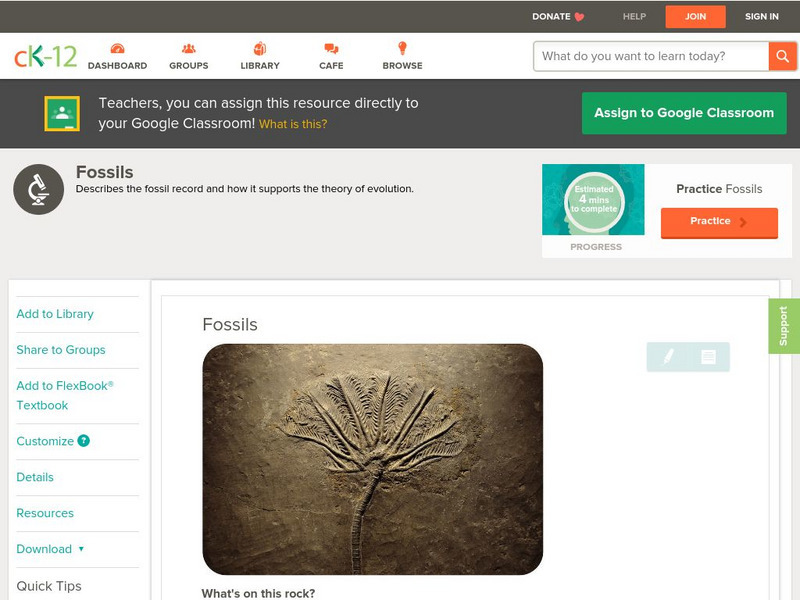Hi, what do you want to do?
Curated OER
Do You See What I See?
Students engage in a lesson that differentiates between right and wrong types of observations. In order to conduct the experiment they are provided with leaves and nameless objects with different designs. The two are compared and...
Curated OER
Life Has A History
In this biology activity, students identify and match various classes of species found today. Then they explain why biodiversity exists today on earth and define evolution. Students also describe who a paleontologist is and what they do.
Curated OER
The Great Jellybean Hunt
Students explore natural selection and its influence on the populations to fine tune traits and characteristics. The acquisition of traits developed out of need is examined through a game played in class.
Curated OER
Carbon Dioxide Emissions
In this emissions worksheet, students will study a graph comparing biological and industrial carbon dioxide emissions over the years and another graph showing the geographic regions of carbon dioxide emissions. Using this information,...
Curated OER
Quiz: Dinosaurs
In this science worksheet, 3rd graders will respond to questions pertaining to dinosaurs. Students will answer ten questions consisting of true/false, and multiple choice.
Curated OER
Dogs & Darwin
Ninth graders construct and conduct a laboratory experiment illustrating the transfer of mutations. They compare and contrast natural selection in organisms with long and short reproductive cycles.
Curated OER
Evolution
In this evolution worksheet, students review genetic variability, gene mutations, biodiversity and adaptations. This worksheet has 22 fill in the blank and 10 short answer questions.
Curated OER
The Rock Cycle
Third graders study the 3 main types of rocks: igneous, sedimentary, metamorphic. They examine samples of these types of rocks and discuss ways to tell what kind of rock each is. They take notes and draw pictures in their science...
Curated OER
Human Evolution
High schoolers make and use observations of Laetoli footprints to provide clues to life in the past. They collect and analyze data to study the relationship between foot length and body height.
Curated OER
Biology Chapter 15 Word Search Puzzle
In this biology worksheet, middle schoolers look for the words that are related to the theme of the worksheet. They also work on the skills of spelling and word recognition.
Curated OER
Why do we need Vitamin C in our diet? Or Why do we carry old inactive genes in our genome?
Students explore and explain how mutations in the DNA sequence of a gene may be silent or result in phenotypic change in an organism and in its offspring. They analyze how evolution and biodiversity are the result of genetic changes that...
Curated OER
Ambush Warriors
Students identify four different categories of reptiles and explain how snakes deliver their venom to their prey.
Curated OER
What came first?
Students sequence events in their own lives and assign each a numerical time, students use the same process to sequence actual events in the evolution of life on Earth.
Curated OER
Global Change — Change and Cycles Where Land, Air and Water Meet
Students participate in an experiment to define a parts-per-billion solution. For this ecology lesson, students select a second substance to create a parts-per-billion solution and observe and record their results. Students work in...
Curated OER
Speciation and Genetic Drift Worksheet
Fifteen terms pertaining to speciation, extinction, and gene flow are to be matched to their definitions. This simple, easy-to-read learning exercise can be used as a pop quiz for your biology learners when studying natural selection...
Alabama Learning Exchange
Botany Scavenger Hunt Where's the Ginkgo?
Learners use a science journal to log plants that are native to Alabama. In this plant lesson plan, students identify characteristics, describe environments, and classify the plants that they find.
Curated OER
Niches and Adaptations
Students present information about a species, its niche, and adaptations. For this lesson on animal environments, students explore how surroundings can affect a given population resulting in adaptation.
Curated OER
Cladograms and Genetics
In this genetics worksheet, students compare the human amino acid sequence with the five animals given. Students used cladograms to complete 11 short answer questions.
Curated OER
Biology: Natural Selection
Students explore evolutionary processes and theories using the spotted fish applet. They observe what happens to fish in a closed environment with both food and predators. Students run the model several times and answer questions about...
University of California
Ucmp: Getting Into the Fossil Record
A learning module where students tour the fossil record to learn what fossils are, how organisms become fossils, the factors that promote fossilization, how paleontologists find fossils, and why some organisms cannot be fossilized....
Other
Tree of Life for the Fossil Record
This tree of life is presented in an outline format. The outline is arranged in a hierarchical manner organized from the largest group (domain) to the smallest group (class). This interactive outline includes pictures of fossils and...
BBC
Bbc: Gcse Bitesize: Evolution Aqa
Evolution is the change of inherited characteristics within a population over time through natural selection, which may result in the formation of a new species. Fossils provide a record of organisms that lived a long time ago. They also...
CK-12 Foundation
Ck 12: Life Science: Fossils
[Free Registration/Login may be required to access all resource tools.] Fossils are the preserved remains of animals, plants, and other organisms from the distant past. By studying fossils, evidence for evolution is revealed....
Indiana University
Indiana University Bloomington: Identifying 3 D Fossil Prints [Pdf]
In this lesson plan, students will identify three-dimensional (3-D) prints of common Indiana fossils to the kingdom, phylum, or class level. Students will observe and record the morphology of specimens and classify organisms based on...



























![Indiana University Bloomington: Identifying 3 D Fossil Prints [Pdf] Lesson Plan Indiana University Bloomington: Identifying 3 D Fossil Prints [Pdf] Lesson Plan](https://static.lp.lexp.cloud/images/attachment_defaults/resource/large/FPO-knovation.png)